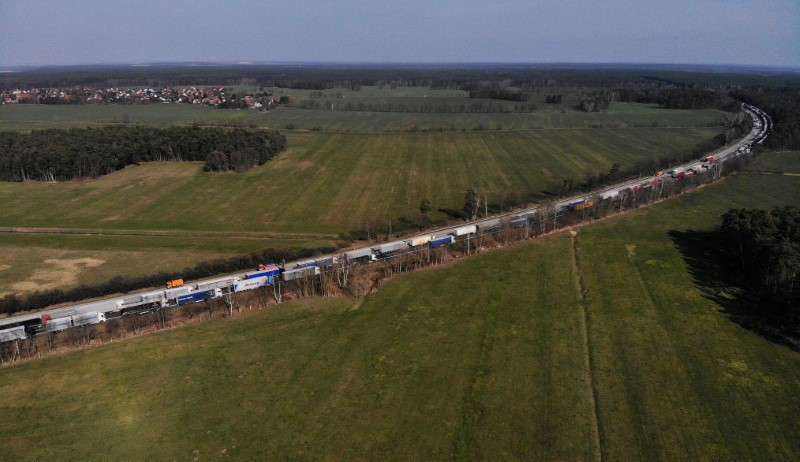BRUSSELS (Reuters) - European Union ministers sparred for more than four hours on Wednesday over emergency border curbs imposed to combat coronavirus that have stranded passengers and supply trucks in lengthy queues from Hungary and Poland to Austria and Italy.
More than a dozen countries moved to tighten or even shut borders that are usually open and uncontrolled in response to the spreading crisis, hitting work commutes, stalling deliveries of goods including food and hampering some health workers.
"The transport sector is being severely affected by a wide range of national measures to contain the pandemic," Croatia, which holds the EU's rotating presidency, said in a statement after a video call of the 27-nation bloc's transport ministers.
"We agreed it is important to keep freight moving, also across borders in order to make sure that essential goods and medical supplies reach our citizens ...
"Responses to COVID-19 should not aggravate economic and social distress by cutting off much-needed transport links. It is imperative that we keep the economy going," it said.
At the Jedrzychowice crossing between Poland and Germany, some travelers have been stranded for 17 hours or longer in recent days without water or access to portable toilets. Trucks and passenger cars have snaked for dozens of kilometers on both sides of the frontier.
Polish Prime Minister Mateusz Morawiecki came under fire from his EU peers on Tuesday for not letting citizens of the three Baltic states cross on their way home from western Europe in a breach of EU law.
Warsaw said on Tuesday it would reopen some crossings with the Czech Republic and Lithuania and let through more vehicles in and out of Germany.
Cars and trucks were also stuck in long lines on normally invisible borders between Slovakia, the Czech Republic, Hungary, Austria and Italy as Europe went into a gradual shutdown, with economists and officials warning of a heavy economic impact.
Slovak interior minister Denisa Sakova said she had raised the issue with the neighboring Hungary: "Truck drivers run a risk of (coronavirus) contagion and the trucks also block deliveries of food and other goods across Slovakia."
The ministers also agreed to a proposal by the bloc's executive European Commission to suspend a rule requiring airlines to run most of their scheduled services or else forfeit landing slots.

While the Commission proposed the emergency measure to last until June to help hard-hit airlines survive, France and some other countries sought a longer period, possibly until October, sources said, with a final decision due in the coming days.